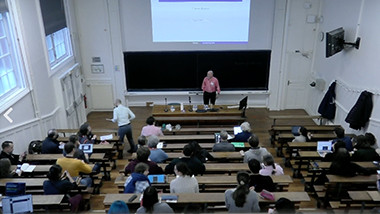
From connecting the dots to conjugacy of dynamical systems
By Pierre Arnoux
Appears in collections : Modeling energy budgets in ecology: DEB theory / Modélisation des budgets d'énergie en écologie : la théorie DEB, Exposés de recherche
Dynamic Energy Budget (DEB) models describe how individual organisms acquire and use energy from food and have therefore been argued to consistently link different levels of biological organisation. Various types of DEB models, differing in the organisation and precedence of metabolic processes such as growth, maintenance and reproduction, have been proposed and investigated, although recently the term DEB theory has become more and more identified with the framework developed by Kooijman. In this lecture I will address the question to what extent differences between DEB models affect the dynamics at the population and community level. I will show that maintenance costs, which are accounted for in all DEB models, have a crucial influence, but that metabolic organisation is of lesser importance. I will furthermore show that population and community dynamics are mostly determined by differences in the capacity of individuals with different body sizes or in different stages of their life history to transform food into new biomass. Such differences, which I refer to as ontogenetic asymmetry in energetics, are however influenced more by the types of food that individuals forage on in different stages of their life history than by their internal energetics. Ontogenetic shifts in resource use during life history are therefore likely to have a larger influence on population and community dynamics than the details of the individual energy budget.
